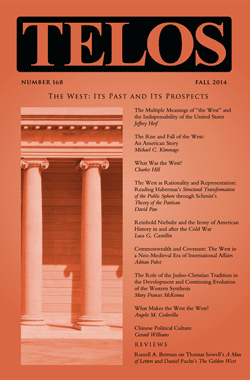Mary Frances McKenna’s “The Judeo-Christian Tradition in the Development and Continuing Evolution of the Western Synthesis” appears in Telos 168 (Fall 2014). Read the full version online at the Telos Online website, or purchase a print copy of the issue in our store.
 In this article, I focus on the impact on modern Western thinking, ideas, and engagement with the world of the loss of the assumption of a creator, or an intelligent ordering agent, in conjunction with the emphasis on detail in preference to the whole in modern thought.
In this article, I focus on the impact on modern Western thinking, ideas, and engagement with the world of the loss of the assumption of a creator, or an intelligent ordering agent, in conjunction with the emphasis on detail in preference to the whole in modern thought.
I begin by discussing some of the critical dynamics contributed by Jerusalem, Athens, and Rome to the concept of Europe in an attempt to identify the source of the energy and vitality arising from this synthesis. I particularly look at the synthesis of Jerusalem and Athens, specifically how each influenced the other and where the potential for synergy arose. This Western synthesis no longer operates in Europe and the West.
In the era of Enlightenment, “critical reason” has come to dominate Western thinking. I explore the sufficiency of this autonomous reason and attempt to identify some of the limitations of this method of thinking and the problems they generate. I include a discussion of the role of religion and God within war and terrorism: religions and God have erroneously become associated with war while the raw material of conflict have been partially ignored.
The purpose of the discussion is to reassess some of the accepted assumptions in modern thought and discourse in relation to religion and God. I hope to demonstrate that where Enlightenment thought is considered as autonomous reason it is insufficient to address the challenges of the modern era. Based on this discussion, I propose an approach to respond to the shortcomings of Enlightenment thinking.








